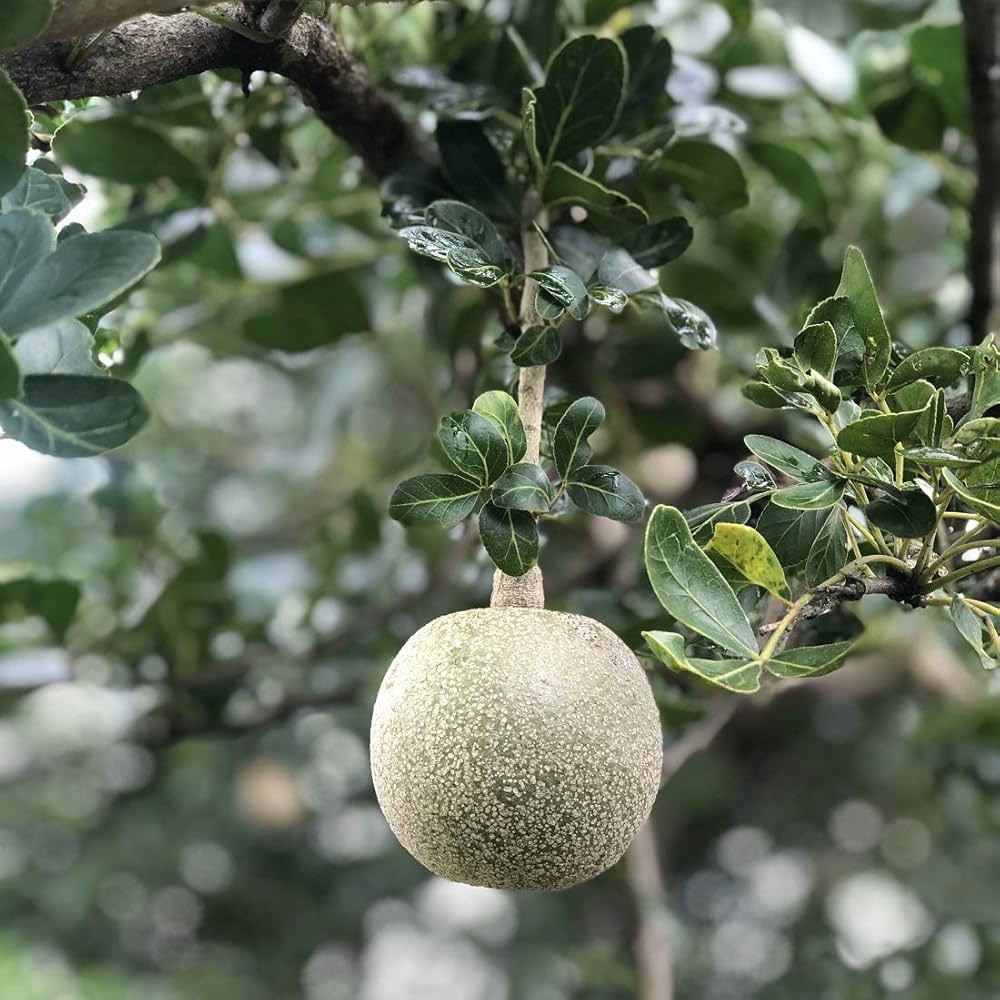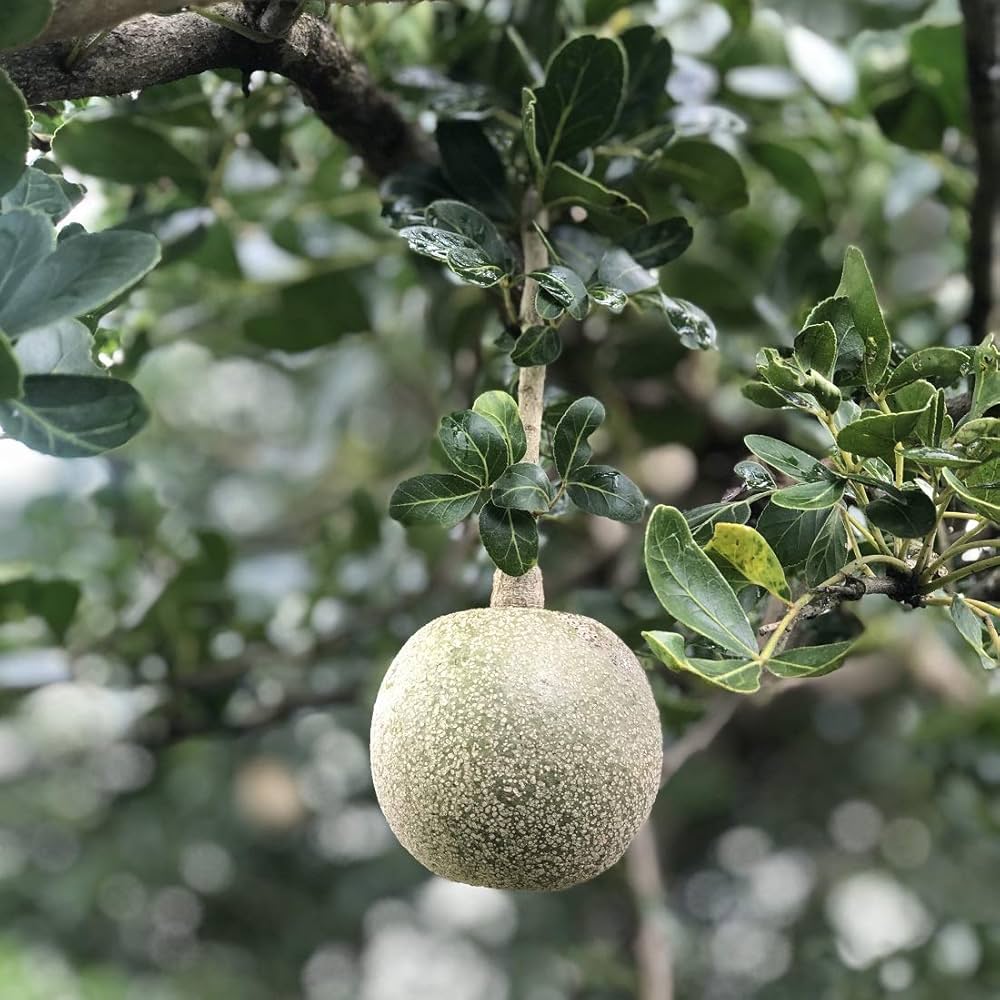
Brief Intro
Kawath Plant – Wood Apple
Basic Product Details
- Scientific Name: Limonia acidissima
- Common Names: Kawath, Wood Apple, Elephant Apple, Koth Bel, Kavath, Kovit, Kaith, Kapittha
- Plant Height: 12-24 inches (approximately)
- Pot Size: 6-10 inch nursery pot
- Plant Type: Perennial, Fruit-bearing
- Soil Type: Well-draining, sandy-loamy soil with good organic content
- Sunlight Requirement: Full sunlight (6-8 hours daily)
Product Overview
The Kawath (Wood Apple) Plant is a hardy, drought-resistant fruit tree known for its nutritious and medicinally valuable fruits. The wood apple has a hard, woody shell with aromatic, tangy-sweet pulp inside, often used for juices, chutneys, and Ayurvedic remedies. This plant is ideal for home gardens, orchards, and farms, offering low-maintenance care and high resilience to harsh conditions.
Features and Characteristics
Growth Habit
- A medium to large deciduous tree, reaching up to 20-25 feet in height.
- Can be grown in pots initially but requires open space for full maturity.
Leaves & Flowers
- Small, dark green leaves with an aromatic fragrance.
- Produces white to pale yellow flowers that attract pollinators.
Fruits
- Hard, round, woody fruit with rough brownish-grey skin.
- The inside pulp is soft, orange-brown, sticky, and highly aromatic.
- Rich in vitamins, minerals, and antioxidants.
Uses of Kawath (Wood Apple) Fruit
Culinary Uses
- Used to make refreshing juices, sherbets, and beverages.
- Added to chutneys, jams, and pickles for a tangy flavor.
- Used in traditional sweets and desserts in many cultures.
Nutritional & Health Benefits
- Rich in Vitamin C, calcium, and fiber, supporting digestion.
- Acts as a natural detoxifier, helping cleanse the liver and kidneys.
- Helps in boosting immunity and reducing inflammation.
- Traditionally used in Ayurveda for digestive and respiratory health.
Harvesting and Farming Details
Farming
Climate Requirements
- Thrives in warm, tropical, and semi-arid climates.
- Tolerates drought conditions and poor soil effectively.
Soil
- Prefers well-draining, sandy-loamy soil with good organic content.
- Avoid excessively waterlogged areas.
Planting Season
- Best planted during spring or monsoon season.
Spacing
- Maintain a 10-15 feet gap between trees for proper growth.
Harvesting
- Fruits mature within 5-7 years after planting.
- Harvest when the outer shell hardens, and fruits develop a strong aroma.
- Allow to ripen at room temperature before consumption.
Care Tips
Light
- Requires full sunlight (at least 6-8 hours daily) for optimal growth.
Watering
- Water once a week, keeping the soil slightly moist but not soggy.
- Reduce watering during winter or rainy seasons.
Fertilizer
- Apply organic compost and well-balanced NPK fertilizers every 2 months.
- Supplement with micronutrients like potassium for better fruiting.
Pruning
- Regular pruning helps maintain shape and remove weak branches.
- Improves fruit production and overall plant health.
Pest Control
- May be affected by scale insects, aphids, and fungal infections.
- Use neem oil spray or organic pesticides for effective protection.
Benefits of Growing Kawath (Wood Apple) at Home
Health & Wellness Benefits
- Chemical-free, homegrown fruits packed with medicinal properties.
- Aids digestion, detoxification, and immune support.
Economic Benefits
- A high-demand fruit in traditional medicine and food industries.
- Can be sold as fresh fruit or processed into powders and syrups.
Environmental Benefits
- Improves air quality and supports biodiversity.
- A low-maintenance tree that enhances soil health.
Placement Suggestions
- Suitable for home gardens, farm orchards, and agroforestry.
- Can be grown in large pots (at least 20 inches wide) for initial years.
- Requires open space with good sunlight for long-term growth.
Common Questions and Answers About Kawath (Wood Apple) Plant
How long does it take for the Kawath plant to bear fruit?
It typically takes 5-7 years to start fruiting, depending on care and climate.
Can Kawath be grown in pots?
Yes, but it requires a large container (20 inches or more) and full sunlight. However, for full growth, planting in open ground is recommended.
How often should I water the plant?
Water once a week, ensuring the soil remains moist but well-drained.
Does Kawath need full sunlight?
Yes, it requires at least 6-8 hours of direct sunlight daily for healthy growth.
When is the best time to harvest Wood Apples?
Harvest when the fruit shell hardens, and a strong aroma develops.
Can Wood Apple be grown indoors?
No, it requires open space with full sunlight for proper growth and fruiting.
Why are my Kawath plant leaves turning yellow?
Yellowing leaves can be due to overwatering, poor drainage, or nutrient deficiency. Ensure proper soil drainage, moderate watering, and regular feeding.
How do I prevent pests on my Wood Apple plant?
Use neem oil spray or mild organic pesticides to protect against insects and fungal infections.
Grow your own Kawath (Wood Apple) Plant and enjoy its nutritious fruits and Ayurvedic benefits right from your garden!
FAQs:
What is the Return Policy?
This product is Not Returnable. It may be replaced or refunded in case of damage or defective condition on a case to case basis.
How to cancel my order?
Cancellation for Live Plants is allowed before the dispatched. You can request cancellation through Your Orders page or by contacting customer service within that time.
What if i received damage product?
If a product is received in a damaged or defective condition, you need to contact the customer service within 1 days of delivery. Free of cost replacement or refund claim is available to you.


